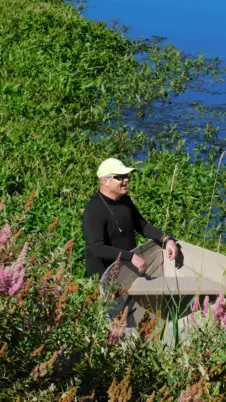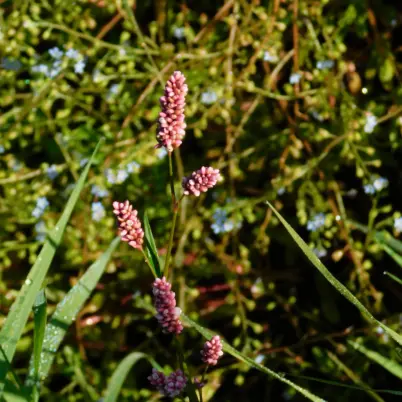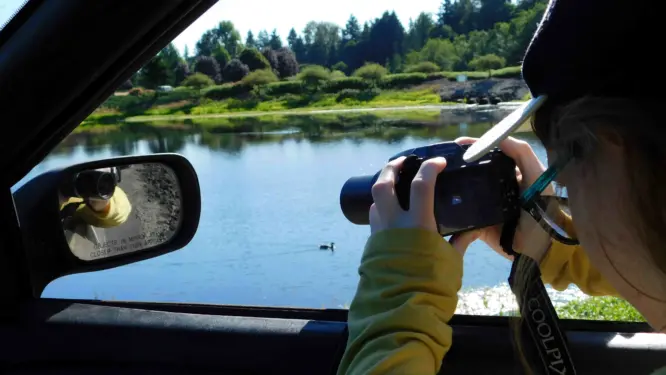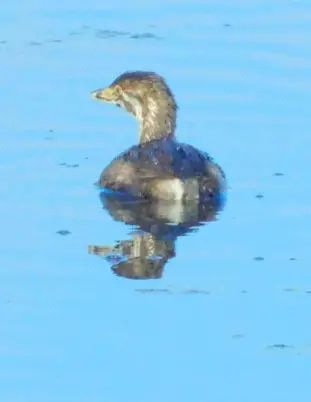The Persicaria Persecution
by Marcia Wilson
“We are going to Flett tomorrow for the Grebe survey. Is there any way you can attend?”–Chris Burke, Ecologist, City of Tacoma

What is a Grebe?
Grebes are six species of diving bird native to the Pacific Northwest. One species, the pied-billed, thrives in the wetlands of Flett Creek, a part of which includes CPTC’s Natural Resources Laboratory & Research Park at Flett Creek.
Grebe comes from an Old French word meaning “comb” which etymologists think could mean the crests on some species. Another explanation comes from biologists in the field. They observed that grebes combed themselves with their bills before they swallowed their feathers. A grebe’s diet centers around fish and insects with sharp body parts. A belly full of feathers is less likely to be injured after a meal.

Grebes are a protected species essential to the complex food webs of the Pacific Northwest. They build unique nests out of vegetation anchored to live water plants with an “escape hatch” in the bottom. Unfortunately for grebes, the perfect springtime nest site is not always ideal a month later when summer may warm the water to the extent that it causes the growth of a plant that slows the stream down.
Go With the Flow
Stream flow is essential to a healthy ecology. Moving water spreads useful components for life such as oxygen and organic material, but also less pleasant items such as pollution and debris. Flowing water also warms up at a slower rate than still water, and the cooler the water the more oxygen it holds.
Flett Creek is no longer a salmonid stream because of urban change, and there are factors that lead it to run warmer and slower than it did in the past. Still, under normal conditions the watershed catches, slows, and gradually releases large amounts of urban runoff. This reduces pollution and flooding events before draining into the salmon-bearing waters of Chambers Bay. So, while the Flett’s retention ponds benefit the region by slowing down fast-moving polluted waters, it would do this more efficiently if not in the grip of the smartweeds.

Smartweed, Persicaria, is an aggressive plant belonging to the buckwheat family. It spreads quickly on the Flett in warm weather, clogging culverts and slowing the water until it barely trickles. To keep the streams flowing, persicaria is removed. This is humorously called “the persicaria persecution” and it is hard work: Cities use dredging, weed-cutting, pulling with hooks, herbicides, earthmoving, or a combination of all. No matter which method of removal is chosen, it cannot start until the areas are thoroughly checked over for grebe nests.
Team Grebe Tacoma: The Swampers
Smartweed removal must be done without harming nests that host grebe eggs and young. Verifying grebes is difficult because the nests are almost invisible in the swamps. They look like a lumps of mud, or an old tree stump wrapped in weeds. Tacoma employees donned wetsuits and waded through the muck, hoping to see signs of the little birds. They slogged through thick patches of smartweed, or watched from a rowboat in the open water.
Team Grebe CPTC: The Spotters

This year only the spotters were free to join the survey. They walked back and forth along the streambanks, watching for anything out of the ordinary and hoping to see or hear grebes. Sometimes they were able to spot from a borrowed car. Their higher point of view let them see large portions of the wetlands, while the team in the swamp could see up-close.
“Wildlife is rarely willing to perform to human expectations.”–attributed to Dr. Faust.
The work was hard for everyone. The day was hot without protection from the sun. The bright glare made it hard to see. All encountered noxious plants and stinging yellow jackets. “Tailgate Pizza” was served at the finale and Dr. Faust stopped by to pay respects.
The Results are In 
No grebe nest or young chicks were visually confirmed. Independent juveniles were reported the next day by spotters at Pond #4, at 400 meters downstream. They were actively fishing for themselves and chasing each other away from their fishing holes. This agreed with the theory that the grebes had already nested earlier in the year when conditions were more favorable. With the reassurance that the risk was minimal, the City of Tacoma began its persicaria persecution on August 2.
